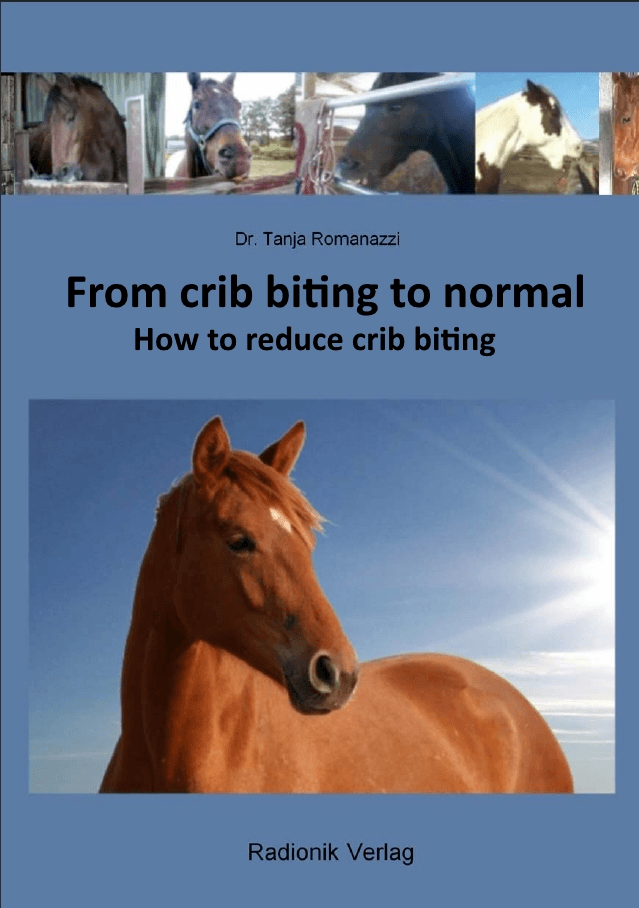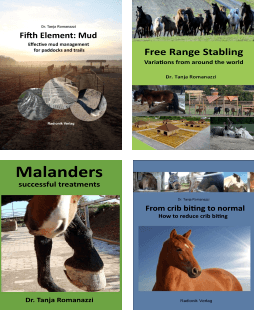How to reduce crib biting

Dear horse owner,
Do the following situations seem familiar?
- You have a crib-biting horse and you keep getting rejected by various stables? Then when you finally do find a stable, other horse owners look at you askance and would like to make themselves scarce whenever your horse belches?
- Your horse is a heavy crib-biter, looks much too thin and stressed and you would like to help it?
- Crib biting annoys you and you just want it to go away?
- You get a lot of ‘good advice’ (about crib-biting collar, crib-biting muzzle, surgery and electrified wires in the horse’s box) that you don’t actually agree with, but can’t really put up a good defence against?
- Your horse is often bloated with air. You are worried about crib-biting colic and don’t know whether crib biting is the cause or not and what you can do against it?
- You want to buy a horse that crib bites, but are unsure what that could entail and what you’d be letting yourself in for?
- Apart from the crib biting, your horse is ‘actually’ OK. Do you then have to do anything against it at all?
If you own a crib-biting horse, then I’m sure you’ll be familiar with these problems and you’ll probably already have spent hours on the Internet and elsewhere looking for answers.
Unfortunately, all you’ll find there are contradictory comments in forums, advertisements for crib-biting collar, crib-biting muzzle or information on operations from animal clinics. Suggested solutions range from ‘do nothing’ to ‘operate immediately’, with no hint of real assistance or therapies. You ask your vet about it. But here, too, you generally get the answer: “There’s nothing you can do about it. If it’s going to get colic sometimes, then it’s best if you bring it to the clinic for surgery. Otherwise just turn a blind eye.”
So is that it? No! In this book, you will see that:
There are also real therapies for crib-biting horses
Crib biting has various causes
Crib biting shouldn’t just be suppressed
I researched this topic for several months and found, to my great surprise:
Crib biting is the subject of study by research groups all over the world.
Unfortunately, the results of these studies stay stuck in the pages of various conference reports, even though they shed light on many new aspects and options for treatment. These results helped us to come to a much better understanding of the causes of crib biting, subsequently eliminate these causes as best we could and then start therapy of physical problems.
Crib biting can be reduced by about 80% in most horses
- Effects of crib biting. Horses don’t crib bite for no reason. Crib biting has some positive effects for the horse, but also causes problems that you have to bear in mind.
- The causes of crib biting. Is it really caught from other horses? What problems does the horse have? Is crib biting then a bad habit or a cry for help? What is the right answer?
- Options for suppression. Here, we deal with the many well-meaning pieces of advice. I will describe the effects of the various methods, like crib-biting collar, crib-biting muzzle and crib-biting rings and why I don’t recommend them.
- Real therapies. Here I will present approaches for treatment. What physical problems play a part? What options for therapy are there? How can a cribbing horse really be helped?
- Specific advice. Wherever possible, we don’t just give vague tips like ‘acupuncture can help as well’. We list the exact acupuncture points that were successful in one experiment.
This ebook presents a closer consideration of the results of 23 studies of crib biting from the USA, Great Britain, Hungary, France, Switzerland, Italy, Finland, Germany and the Netherlands. Trust me – you’ll have a completely different view on crib biting to the one promoted by vets and fellow riders. And you’ll get some real assistance in helping your horse and helping it to significantly reduce its crib biting.
Take a look here is the content page:
1. CRIB BITING: BAD HABIT OR CRY FOR HELP?
2. WHAT IS CRIB BITING?
3. EFFECTS - AND - HOW DOES THE HORSE BENEFIT?
STRESS FOR THE OWNER
STRESS MANAGEMENT FOR THE HORSE
STIMULATION OF SALIVA PRODUCTION
BAD FEEDING
Is THERE A GREATER DANGER OF couc?
DETERIORATION OF THE TEETH AND MUSCULAR DEFORMITY
BAD LEARNING BEHAVIOUR?
4. CAUSES OF CRIB BITING
STRESS AND INCORRECT FEEDING
THE STOMACH
IS IT PICKED UP FROM OTHER HORSES?
GENETIC PREDISPOSITION
SHOCK AS A TRIGGER
5. OPTIONS FOR SUPPRESSION
ALTER THE CONFIGURATION OF THE STALL
CRIB-BITING COLLAR
MUZZLE FOR CRIB BITERS
ELECTRIC SHOCK THERAPY
HOG- OR BULL-RINGS
SURGERY
6. REAL THERAPIES
ELIMINATION OF CAUSES
APPROACHES TO TREATMENT
OPTIONS FOR TREATMENT
7. CONCLUSION
REFERENCES
Author: Dr. Tanja Romanazzi. Ebook as pdf-file with 109 pages, A5 format (half-letter), published in 2009, revised November 2014, translated 2014 from German to English, price: €20.47 + VAT


